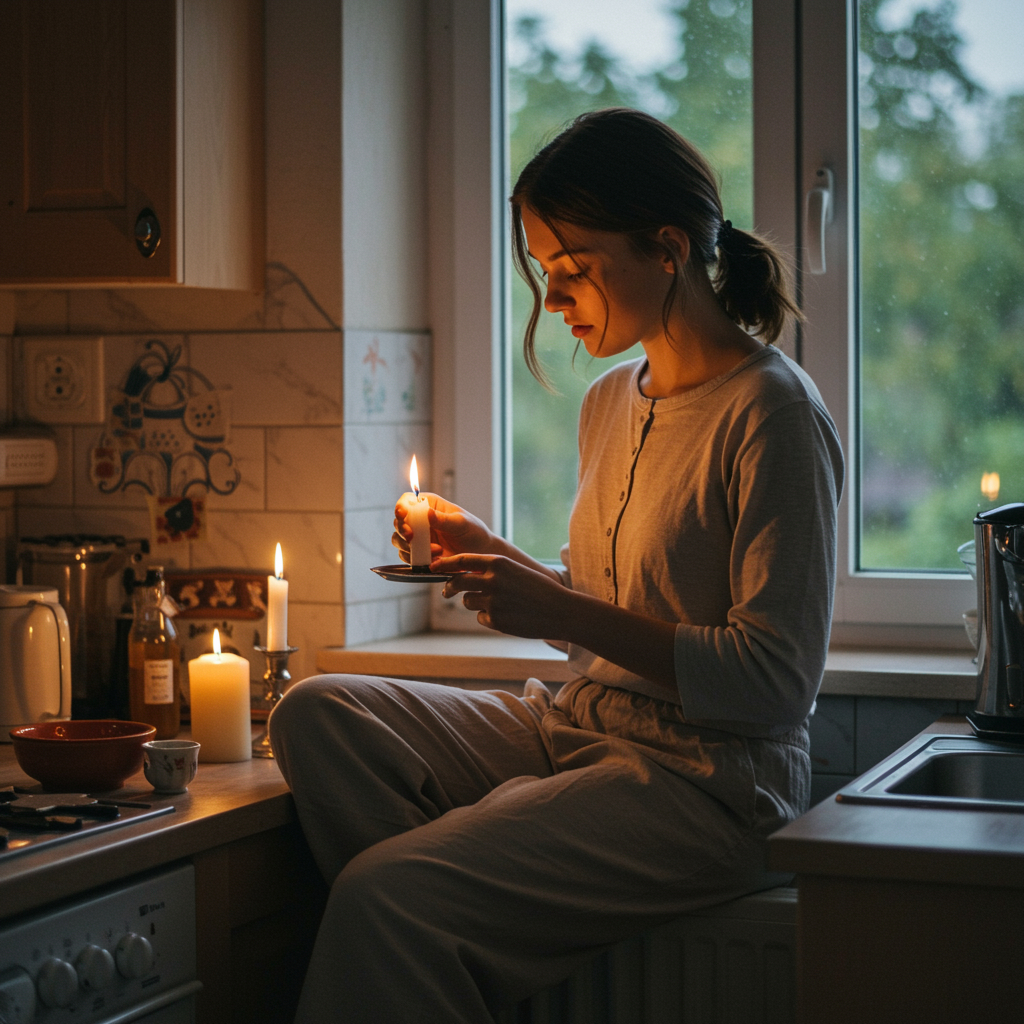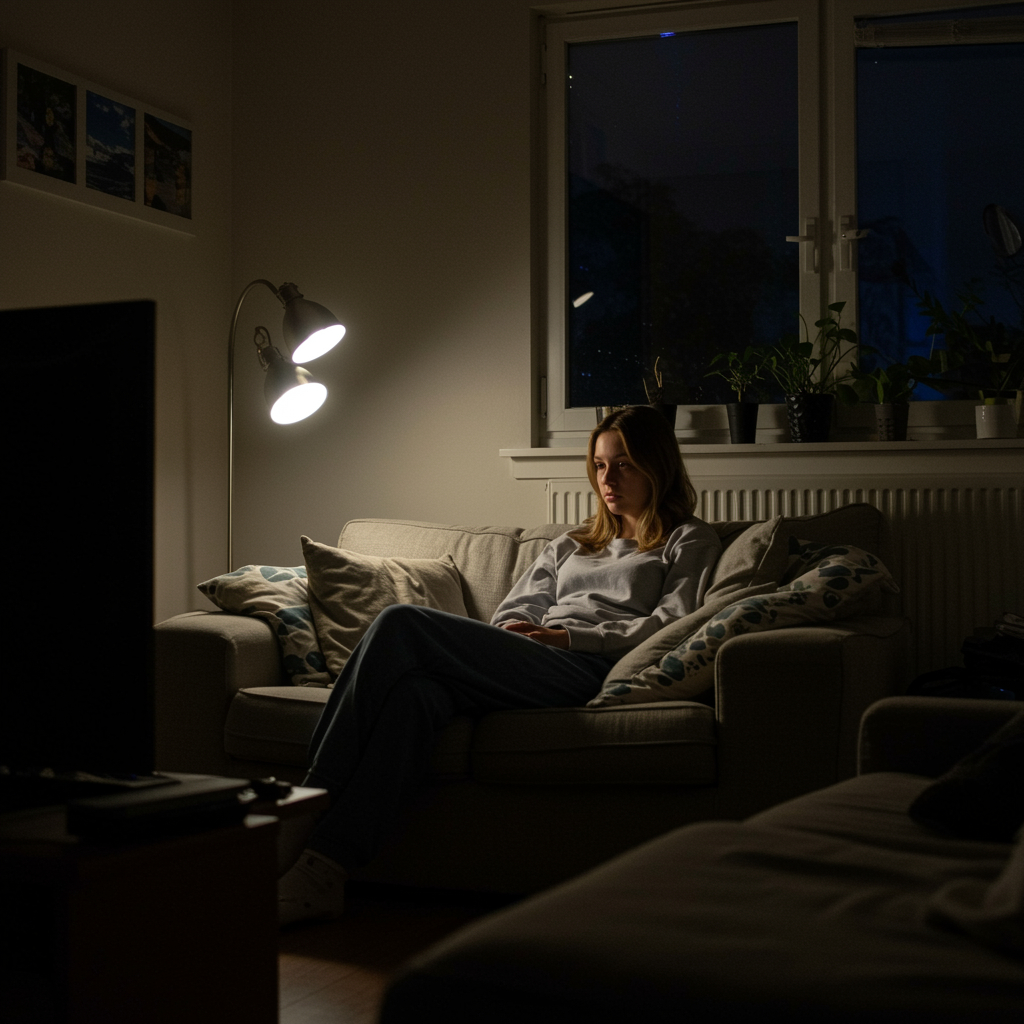Quick note before we start: Hi, I’m Mariam, I’m not a doctor or therapist. I’m just someone who has dealt with the same nighttime worries and restless feelings you might have. I’ve spent years reading research, talking with mental health experts, and trying different approaches to see what works. I still have rough days (like everyone), but I want to share what’s helped me and the science behind it. Use what works for you, ignore the rest, and please talk to a professional if something doesn’t feel right.
Ever tried to relax with a candle, cozy couch, and calm music, only to feel your heart racing instead? When worries flood your mind, your hands get sweaty, and you end up scrolling on your phone, annoyed that your “relaxation time” is actually making you feel worse.
If that sounds like you, you’re experiencing what psychologists call stress relaxation. It’s when trying to relax actually makes you feel more stressed instead. About one-third to one-half of adults deal with this frustrating problem – trying to calm down but feeling anxious instead. If this keeps happening, it can lead to anxiety, depression, or even panic attacks.

But don’t worry! This problem can be fixed, and you don’t need to be a meditation expert to do it. In this article, we’ll explain why it happens, look at three habits that make it worse, and share nine practical, science-backed ways to help your body truly relax.
What exactly is “stress relaxation”?
Stress relaxation happens when your mind and body aren’t on the same page. You try to relax, but your body stays stressed out – your heart races, your chest feels tight, and your thoughts won’t slow down. It’s like your body doesn’t get the message that it’s time to calm down. As soon as you stop being busy with work, school, or taking care of others, your body’s alarm system (the sympathetic nervous system) suddenly activates as if you’re in danger.
Why does this happen when you try to relax? It’s because being busy actually hides your worries. When you finally slow down, those hidden worries suddenly appear. Your brain thinks, “Now I have time to think about all these problems!” and fills your mind with unchecked tasks, relationship issues, and world problems. Your body sees these thoughts as threats and releases adrenaline to “help” you – even though you’re trying to relax.
Pushing through this feeling once in a while isn’t a big deal. But when it keeps happening, your brain starts to connect relaxation (like bedtime or yoga class) with feeling uncomfortable. This creates a harmful cycle: you start dreading rest, so you avoid it, which makes you more tired, which makes you feel even worse during the few breaks you do take.
What happens in your body when you try to rest
Looking inside your body, you’ll see hormones working together, but sometimes playing the wrong tune. Normally when you relax, your “rest system” takes over – your breathing slows, your body focuses on digestion, and you feel sleepy. But when stress relaxation happens, this switch doesn’t flip. Your stress system keeps producing cortisol (a stress hormone), while your relaxation nerve (the vagus nerve) stays quiet. Your blood vessels tighten, your pupils get bigger, and sugar rushes into your bloodstream, as if you’re in danger, even though you’re perfectly safe. This explains why you can feel both tired and wired at the same time. Understanding this biology helps you realize it’s not that you’re “bad at relaxing”, it’s just that your body needs different signals to calm down.
Why it’s hard to relax: Common traps
Denial: “I’m fine, really.”
Ignoring your stress only works for a short time before it makes things worse. Sure, it might help you cope right after something bad happens. But your body still shows stress signals: your heart beats fast, your hands get sweaty, and you breathe quickly. When you ignore these warning signs and just sit on the couch instead of dealing with the real problem (like an unfinished task, too many emails, or an argument with someone), you’ll actually feel more stressed, not less.
Quick Reframe: Stress symptoms are not your enemies. They’re like alerts from your body telling you something needs your attention. Think of them like the warning lights on your car dashboard – they’re asking you to take action, not ignore them.
Approval chasing: “What will people think?”
You might love your job or hobby. That’s great! But sometimes we work hard just to impress others – our bosses, family members, social media followers, or even critics we imagine in our heads. When this happens, taking breaks feels wrong, like you’re being lazy. So you work when you’re sick, never take days off, and feel bad about taking a nap on Sunday. Eventually, your body gets too tired and you burn out. And in those few moments when you do try to rest, you feel guilty: I should be answering emails right now.
Choice overload: “What if I pick the wrong option?”
Perfectionistic brains want the best vacation spot, the most relaxing playlist, the ideal breathing pattern. Endless analysis keeps the mind revved and steals the very serenity you’re chasing. Even after choosing, you second‑guess, was a spa day smarter than a beach day? With mental energy stuck comparing scenarios, genuine calm never arrives.
9 Simple Ways to Actually Relax When You’re Stressed
Here are some simple, research-backed tools to help you relax. Just try one or two this week and see what works best for you in your everyday life.

1. Write down what’s bothering you
Grab a pen and paper and write down all your worries for five minutes straight. Don’t worry about organizing them or judging yourself – just get everything out of your head. Research shows this “brain dumping” helps calm your body because your brain stops recycling the same thoughts over and over. Plus, once you see your problems written down, they often seem smaller or you might notice simple next steps you can take.
2. Notice what your body feels
After writing down your worries, check your body: Where do you feel tension? For example, you might notice a “tight jaw” or “butterfly feeling in your stomach.” Just naming these feelings (“I feel tightness here”) helps calm your brain’s fear center. It’s a simple form of mindfulness that anyone can do.
3. Plan your relaxation time ahead
Avoid feeling overwhelmed by deciding when to relax before you need to: Friday 7–7:30 p.m. I play guitar; Sunday 3 p.m. nature walk. When your planned time arrives, you can just start relaxing instead of wasting time deciding what to do. Research shows that making specific plans (if this happens, then I’ll do that) helps reduce putting things off and feeling anxious.
4. Use movement instead of trying to be still
Your body’s stress response is designed to help you take action. So when you’re stressed, try moving your body instead of forcing yourself to sit still. Take a quick 10-minute walk, dance to your favorite song, or do 20 jumping jacks. This physical activity uses up the stress hormones in your body and tells your brain that everything is okay. After moving your body, then you can enjoy quieter activities like reading or taking a bath.
5. Try active relaxation instead
If sitting still for meditation makes you feel restless, don’t worry! Try something hands-on instead, like making bread dough, painting with watercolors, or slowly preparing coffee. Research shows that getting fully absorbed in an activity can calm your nervous system just as well as quiet meditation – and sometimes it works even better for people with busy minds.
6. Create a simple rest reminder
Make up a short phrase that gives you permission to rest, like “Taking breaks helps me work better,” “Rest makes me stronger,” or just “It’s okay to rest now.” Say this phrase out loud when you start feeling guilty about relaxing. Over time, this reminder helps change how you think about taking breaks.
7. Take short breathing breaks during work
Don’t wait until after work to relax. Take quick breaks throughout your day. Set a timer for every 90 minutes, close your eyes, and breathe in for 4 counts, then breathe out for 6 counts. Breathing out longer than you breathe in helps activate your body’s natural relaxation system, which slows down your heart rate.
8. Let it out (yes, really)
Here’s something surprising: saying a bad word out loud into a pillow can actually help reduce pain and release stress. A small study from Britain found that swearing can improve your mood and help you bounce back from stress. If you don’t like using bad words, try screaming into a towel instead. The main idea is that expressing your feelings works better than keeping them bottled up inside.
9. Check your screen time
Too much scrolling on your phone keeps stress hormones flowing. Try a simple rule: 30 minutes before bed, put your phone in another room, dim all screens, and lower the lights. Instead of scrolling, read a book, do some gentle stretching, or write down three good things that happened today. Your mind needs this break to switch from busy mode to rest mode.
Instead of scrolling on Tiktok or Instagram, you can try reading, which can help to disconnect from browsing addiction and create a safe space for your brain and nerves.
When to seek extra help
If you’ve tried several solutions and still can’t relax, it’s time to get help. If you have ongoing sleep problems, regular feelings of panic, or sadness that lasts more than two weeks, talk to a professional. Therapies like CBT can help change negative thinking patterns, while body-focused approaches (like EMDR or special yoga classes) can help with stress stored in your body.
Also, get a medical check-up. Problems like thyroid issues, low iron, hormone changes, or medication side effects can feel like anxiety. A simple doctor’s visit could solve months of unnecessary suffering.
What Rest Really Means
Many of us think being productive all the time is what matters. But our bodies work differently. We need rest, just like phones need charging. During breaks, our bodies heal, our brains sort memories, and our immune systems clean up. Think of rest not as being lazy, but as an active way to improve your thinking, creativity, and connection with others tomorrow.
Your Simple Day Reset Plan
Here’s an easy plan you can try today:
- Morning (7 a.m.)
- Write down your top three tasks for the day before checking email. This helps clear your mind.
- Midday (12 p.m.)
- Take a 10-minute walk outside. Move your arms, look at the sky, and leave your headphones at home.
- Afternoon (3 p.m.)
- Take 2 minutes to breathe: in for 4 counts, out for 6 counts. Say to yourself: “Taking breaks helps me work better.”
- Evening (6 p.m.)
- Write down any leftover work thoughts in a notebook and close it. Then cook dinner while playing music you enjoy.
- Night (9 p.m.)
- Put away all screens. Read a book, take a warm shower, or do some gentle stretching for 10 minutes.
Try this for one day and see how you feel. Does resting feel easier? Adjust the times and activities until you find what works for you.
Feeling stressed when you try to relax is actually normal. It happens when your body’s stress response activates at the wrong time. The same alertness that helped our ancestors survive dangers can now keep your mind racing during a movie or date night.
Don’t blame yourself for not being able to relax. Instead, give your body clear signals that it’s safe to calm down. Try one or two of the techniques we discussed. You could write down your worries at lunch, take a short breathing break in the afternoon, or walk around the block before bed to unwind.
Pay attention to small improvements: when your jaw feels less tight, when your breathing slows down, or when you notice a worried thought without getting caught up in it. Each small win teaches your brain that rest is safe. Eventually, feeling calm won’t be rare—it will become a familiar state you can return to whenever you need.
Remember, being productive isn’t just about checking tasks off your list. True productivity includes having new ideas, enjoying conversations, and feeling present in your life. Rest helps with all of these. So try again with that candle, take a deep breath, and let yourself relax—both you and your work will benefit.
Follow me on Instagram and let me know if you have any questions.

